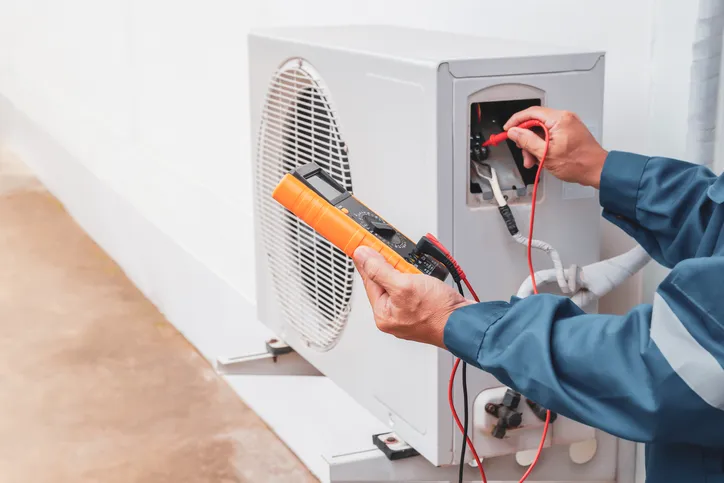Garage Heating & Air Conditioning in Winder, GA
Get reliable garage heating & AC services in Winder, GA with Res Air LLC. Improve comfort in every season. Call today to schedule reliable HVAC service!
Converting an unconditioned garage into a comfortable, year‑round space is one of the most cost‑effective home upgrades for homeowners in Winder, GA. With hot, humid summers and occasional cool snaps in winter, an appropriately sized garage heating and air conditioning system protects vehicles and tools, prevents moisture damage and mold, and makes workshops or bonus rooms usable through every season. This page explains common garage HVAC needs in Winder, how professionals evaluate the space, equipment options (ductless mini‑splits, packaged units, electric or gas heaters), ventilation and safety considerations, energy‑efficiency measures, and the maintenance plans that keep a conditioned garage performing well.
Why a conditioned garage matters in Winder, GA
- Summer humidity accelerates corrosion and can damage finishes, electronics, and stored belongings.
- Mild winters still bring cold mornings that affect starter batteries and hand tools; occasional freezes can harm plumbing in attached garages.
- Many homeowners convert garages into workshops, home gyms, or living space—these uses need reliable temperature and humidity control.
- Proper conditioning improves indoor air quality by reducing dampness and preventing mold growth common in the Southeast.

Common garage HVAC issues in Winder, GA
- Poor insulation and air leakage through garage doors and unsealed joints
- High humidity and condensation, especially on cool surfaces during summer
- Inadequate electrical service for compressor-based systems or mini‑splits
- Unsafe combustion venting when using gas heaters in attached garages
- Oversized or undersized equipment leading to short cycling, humidity problems, or excessive energy use
How a garage HVAC assessment is done
A professional assessment starts with understanding how you use the garage and measuring the space. Key steps include:
- Measuring square footage and ceiling height to determine conditioned volume.
- Inspecting insulation levels (walls, ceiling/attic, and garage door) and identifying air leaks.
- Checking existing electrical capacity, breaker availability, and gas lines if considering combustion heat.
- Assessing ventilation, potential combustion appliance conflicts, and local code requirements.
- Performing a simple load calculation to recommend system capacity and placement that balances comfort and efficiency.
This upfront work prevents common mistakes like undersizing a system, failing to address humidity, or installing an unsafe gas appliance in an attached garage.
Equipment options and when to choose them
The right solution depends on your garage size, insulation, electrical service, and intended use.
- Ductless mini‑splits
- Pros: Highly efficient, provide both cooling and heating, zoned control, minimal ductwork, easy installation for retrofits.
- Best for: Workshops, bonus rooms, or garages converted to living space where precise temperature control and dehumidification matter.
- Packaged rooftop or wall‑mounted units
- Pros: All‑in‑one outdoor units with ducted or short-run duct installations; good for larger attached spaces with existing ducting.
- Best for: Larger garages where a central approach is preferred and space permits.
- Electric resistance heaters (baseboard or forced‑air)
- Pros: Simple, lower upfront cost, quick heat.
- Cons: Less efficient for continuous heating and can raise energy bills during prolonged cold periods.
- Best for: Occasional heating needs in well‑insulated garages or where refrigeration/cooling is not required.
- Gas heaters
- Pros: Fast, powerful heating and often lower operating cost in winter where gas is cost‑effective.
- Safety note: Gas heaters require correct venting and separation from living spaces; not advisable in attached garages without proper combustion air and exhaust systems.
Selection should consider SEER/HSPF ratings for heat pumps, capacity to dehumidify, and the ability to modulate output for humidity control.
Ventilation and safety considerations
Safety and proper ventilation are non‑negotiable in garage conditioning projects, particularly in attached garages or where fuel‑burning appliances exist.
- Install carbon monoxide detection if combustion appliances are present or nearby.
- Ensure gas heaters have proper combustion air and venting to the exterior; avoid heating solutions that introduce combustion gases into living areas.
- If converting to a living or sleeping area, verify local building codes for egress, ventilation, and mechanical separation.
- Manage garage door seals and weatherstripping to control infiltration while maintaining adequate ventilation for any appliances.
- Consider adding mechanical ventilation or a continuous exhaust fan if moisture or fumes are present from projects and vehicle storage.
Energy‑efficiency tips for Winder garages
- Upgrade insulation: aim for at least R‑13 in walls and higher in the ceiling/attic; fit an insulated garage door and good weatherstripping.
- Use a high‑efficiency mini‑split with inverter technology for both heating and cooling and strong dehumidification performance.
- Add programmable or smart thermostats to limit conditioning when the garage is unused and to precondition before use.
- Zone the garage separately from the main house to avoid wasted energy conditioning unused space.
- Address air leaks around doors, windows, and penetrations before sizing equipment—improving building shell performance often reduces required HVAC capacity.
Installation process (typical steps)
- Finalize scope based on the assessment, intended use, and local code requirements.
- Prepare space: seal air leaks, improve insulation, install vapor barrier if needed, and upgrade electrical or gas services as required.
- Mount equipment: install outdoor condenser, indoor head or air handler, run refrigerant lines or ducts, and position heaters or packaged units.
- Connect electrical and gas safely to code, and install condensate management for cooling systems.
- Commission system: vacuum and charge refrigerant, test airflow, verify thermostat calibration, and confirm safe combustion venting if applicable.
- Provide homeowner orientation on operation, humidity controls, and routine care.
Maintenance plans to keep a conditioned garage comfortable year‑round
Regular maintenance extends equipment life and maintains efficiency:
- Seasonal tune‑ups for cooling and heating systems, including coil cleaning and refrigerant checks.
- Replace or clean filters every 1–3 months depending on use.
- Inspect and clear condensate drains and pans to prevent overflow and mold.
- Check garage door seals and weatherstripping annually.
- Test carbon monoxide detectors and ventilation systems if combustion appliances are nearby.
- Verify thermostat sensors and recalibrate as needed for consistent comfort.
Benefits of a properly conditioned garage
- Protects vehicles, tools, and stored items from humidity and temperature extremes.
- Increases usable square footage and comfort for hobbies, workshops, or home gyms.
- Reduces chance of mold and mildew, improving overall indoor air quality for adjacent living spaces.
- Enhances energy efficiency when paired with insulation and proper system sizing.
- Provides predictable, balanced comfort that supports year‑round use in Winder’s humid climate.
A tailored garage heating and air conditioning plan starts with a thorough assessment of your garage’s construction and your intended use. Addressing insulation, ventilation, equipment selection, and a regular maintenance schedule will deliver reliable comfort and protect your investment over time in Winder, GA.
Take Control of Your Garage Comfort Today
Don’t let temperature swings or humidity limit the use of your garage. Whether you’re protecting valuable tools, creating a workshop, or transforming your garage into a year-round living space, the right heating and cooling system makes all the difference. Trust Res Air LLC to design and install a tailored solution that keeps your garage comfortable, efficient, and safe in every season. Call us today to schedule your assessment and start enjoying a conditioned garage built for lasting performance.


Financing
We make comfort affordable with flexible financing options through Optimus and Synchrony, giving you stress-free payment solutions for your HVAC needs.


Customer Testimonials
At Res Air, our customers’ satisfaction speaks louder than words. From fast emergency repairs to flawless system installations, homeowners trust us for reliable comfort and professional service.


.png)
.jpg)
